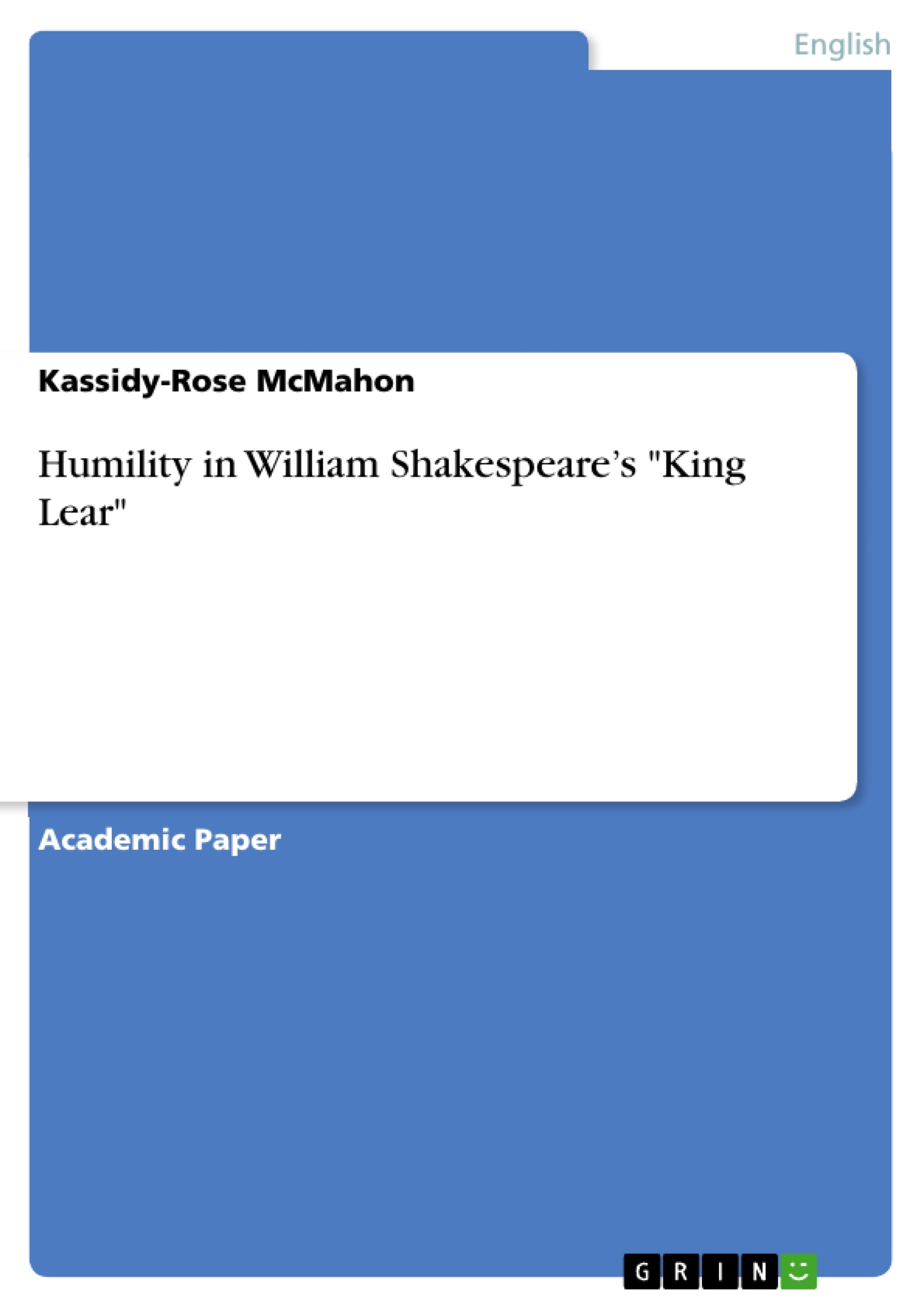Humility is an important virtue, especially for kings who hold immeasurable power. In William Shakespeare’s tragedy play 'King Lear', Lear clearly lacks humility. This essay argues Lear must learn humility. He must learn that his offence against the kingdom is not just political, in the sense that he makes a wrong decision about how to govern, but also ethical and humanitarian, in that he comes to understand his own responsibility for rooted social injustice.
Inhaltsverzeichnis (Table of Contents)
- Humility in William Shakespeare's King Lear
- Lear's Decision to Relinquish His Reign
- Lear's Hubris and the Division of the Kingdom
- The Downfall of the Kingdom and Lear's Political Offense
- Lear's Ethical Implications and Family Destruction
- Lear's Loss of Loyal Servants
- Lear's Madness and the Role of Humility
- Role Reversal Between Lear and Fool
- Lear's Humanitarian Evolution
Zielsetzung und Themenschwerpunkte (Objectives and Key Themes)
This essay delves into the significance of humility, particularly for a powerful figure like King Lear, within the context of William Shakespeare's tragic play. It examines Lear's lack of humility, arguing that his decision to relinquish his reign is not only politically flawed but also ethically and humanitarily problematic. It further explores the repercussions of his actions, including the destruction of his family structure and the chaos that ensues in his kingdom. The essay investigates how Lear's character flaws contribute to his descent into madness and the role of humility in his journey of self-discovery.
- The Significance of Humility in Power
- Lear's Decision to Relinquish his Reign and its Consequences
- The Impact of Lear's Actions on his Family and Kingdom
- Lear's Character Flaws and Descent into Madness
- Humility as a Catalyst for Self-Knowledge and Transformation
Zusammenfassung der Kapitel (Chapter Summaries)
- Lear's Decision to Relinquish His Reign: The essay discusses the unconventional decision of King Lear to prematurely relinquish his reign, dividing his kingdom among his daughters. It explores the motivations behind his decision, contrasting arguments for his lazy and self-interested motives with those who view his actions as altruistic.
- Lear's Hubris and the Division of the Kingdom: The essay analyzes Lear's flawed method of dividing his land, demanding his daughters to profess their love for him. It highlights his excessive pride, poor judgment, and gullibility, leading him to favor his manipulative daughters, Goneril and Regan, over his honest and loving daughter, Cordelia.
- The Downfall of the Kingdom and Lear's Political Offense: The consequences of Lear's decision are explored, demonstrating the chaos and cruelty that befall his kingdom. The essay emphasizes how Lear's foolishness and blindness instigate the hardship he later experiences, and his eventual realization of his political offense against the kingdom.
- Lear's Ethical Implications and Family Destruction: The essay examines the ethical implications of Lear's actions, specifically the destruction of his family structure after banishing Cordelia. It highlights the consequences of his anger and his eventual remorse for his actions, leading him to seek forgiveness from his estranged daughter.
- Lear's Loss of Loyal Servants: The essay explores Lear's rejection of the advice of his fiercely loyal servant, the Earl of Kent, arguing that this decision contributes to the tragic events that unfold. It highlights Lear's temper, conceit, and tyranny, which ultimately lead to the loss of his most loyal companion.
- Lear's Madness and the Role of Humility: The essay discusses the contributing factors to Lear's descent into madness, including his vanity, age, fear of death, and disappointment in Cordelia. It highlights the role of humility in Lear's journey of self-discovery, emphasizing his eventual recognition of his ethical wrongdoings and his attempt to reconcile with those he hurt.
- Role Reversal Between Lear and Fool: The essay examines the significant role reversal between Lear and Fool, highlighting how Fool's playful ridicule exposes Lear's foolishness and contributes to his understanding of his actions. It emphasizes the wisdom Fool possesses despite his status, which ultimately leads Lear to self-awareness.
- Lear's Humanitarian Evolution: The essay analyzes Lear's transformative experience during the storm, demonstrating his newfound humility and compassion. It explores how the natural forces compel him to reprioritize his values, leading to a greater appreciation for the simple things in life and a more empathetic understanding of others.
Schlüsselwörter (Keywords)
This essay explores the themes of humility, power, responsibility, ethical implications, family dynamics, madness, self-knowledge, and transformation within the context of William Shakespeare's King Lear. It delves into the motivations behind Lear's decision to relinquish his reign, the consequences of his actions, and the role of humility in his personal and political downfall.
Frequently Asked Questions about Humility in King Lear
Why is humility a central theme in Shakespeare's King Lear?
Humility is portrayed as an essential virtue for those with power. The play shows Lear's journey from a lack of humility to self-discovery and an understanding of social injustice.
What was King Lear's political offense?
Lear's political offense was his decision to divide his kingdom based on his daughters' professions of love, which led to chaos and the destruction of the social order.
How does the Fool contribute to Lear's development?
The Fool uses ridicule and wisdom to expose Lear's foolishness, acting as a catalyst for Lear's eventual self-awareness and humility.
What role does the storm play in Lear's transformation?
The storm forces Lear to face his own vulnerability and human fragility, leading to a newfound compassion for the poor and a more empathetic worldview.
Why did Lear favor Goneril and Regan over Cordelia?
Lear was blinded by hubris and vanity, favoring the manipulative and flattering words of Goneril and Regan over Cordelia's honest and simple expression of love.
- Quote paper
- Kassidy-Rose McMahon (Author), 2019, Humility in William Shakespeare’s "King Lear", Munich, GRIN Verlag, https://www.grin.com/document/1216297



